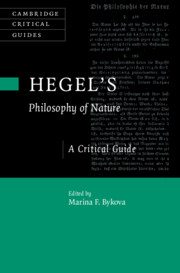Book contents
- Hegel’s Philosophy of Nature
- Cambridge Critical Guides
- Hegel’s Philosophy of Nature
- Copyright page
- Dedication
- Contents
- Contributors
- Acknowledgments
- Abbreviations
- Hegel’s Philosophy of Nature
- Part I Hegel’s Philosophy of Nature in the Historical and Systematic Context
- Part II Cosmology, Mechanics, and Physics
- Part III Organics
- Part IV On Contemporary Challenges for the Philosophy of Nature
- Chapter 13 The Prospects for an Idealist Natural Philosophy
- Chapter 14 Is There a Future for the Philosophy of Nature?
- Bibliography
- Index
- Cambridge Critical Guides
Chapter 13 - The Prospects for an Idealist Natural Philosophy
Logic and Nature
from Part IV - On Contemporary Challenges for the Philosophy of Nature
Published online by Cambridge University Press: 19 December 2024
- Hegel’s Philosophy of Nature
- Cambridge Critical Guides
- Hegel’s Philosophy of Nature
- Copyright page
- Dedication
- Contents
- Contributors
- Acknowledgments
- Abbreviations
- Hegel’s Philosophy of Nature
- Part I Hegel’s Philosophy of Nature in the Historical and Systematic Context
- Part II Cosmology, Mechanics, and Physics
- Part III Organics
- Part IV On Contemporary Challenges for the Philosophy of Nature
- Chapter 13 The Prospects for an Idealist Natural Philosophy
- Chapter 14 Is There a Future for the Philosophy of Nature?
- Bibliography
- Index
- Cambridge Critical Guides
Summary
Hegel’s “natural philosophy” is an extension of his overall systematic project having to do with a post-Kantian philosophy that did not rely on Kant’s conception of “pure intuitions.” Instead, Hegel proposed a Logic that as an internally self-enclosed system of pure thoughts required to make sense of making sense. Famously, he concluded his Logic with some not entirely clear ideas about the need to move from it to a Naturphilosophie, a move which he somewhat puzzlingly said was not itself a further logical “transition.” Hegel also defends a non-empiricist study of nature, that is, an explanation not merely in terms of empirically determined regularities, for all such regularities, although existent, are not fully “actual” in that they are not what is doing the real work of explanation. What explains the regularities themselves are the various pure objects of the Naturphilosophie which are involved in working out what “external to pure thought” would mean: the mechanical, the physical, the chemical, and the biological fields of nature, each of which manifests a power (Potenz) that explains why the empirically found regularities in nature actually hold. This chapter suggests that the reason for the transition from Logic to Nature is that pure thought on its own is powerless, and that this has implications for how we think of Hegel’s system as a whole.
Keywords
- Type
- Chapter
- Information
- Hegel's Philosophy of NatureA Critical Guide, pp. 259 - 272Publisher: Cambridge University PressPrint publication year: 2024

